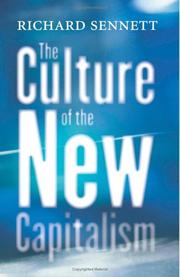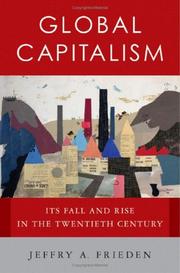| Listing 1 - 9 of 9 |
Sort by
|
Book
ISBN: 9782130554301 213055430X Year: 2006 Publisher: Paris : Presses universitaires de France,
Abstract | Keywords | Export | Availability | Bookmark
 Loading...
Loading...Choose an application
- Reference Manager
- EndNote
- RefWorks (Direct export to RefWorks)
AA / International- internationaal --- 330.52 --- Liberaal systeem. Neo-liberalisme. Theorie van de onderhandeling. --- Capital --- International finance --- Marxian economics --- International monetary system --- International money --- Finance --- International economic relations --- Capital assets --- Fixed assets --- Economics --- Capitalism --- Infrastructure (Economics) --- Wealth --- Marxist economics --- Communism --- Schools of economics --- Socialism --- Liberaal systeem. Neo-liberalisme. Theorie van de onderhandeling --- Capitalisme --- Finances internationales --- Accumulation capitalistique --- Économie marxiste --- Lutte des classes --- Analyse marxiste

ISBN: 0691125910 9780691125916 0691136386 1400837448 9786612964657 1282964658 9781400837441 9780691136387 Year: 2006 Publisher: Princeton, N.J. Princeton University Press
Abstract | Keywords | Export | Availability | Bookmark
 Loading...
Loading...Choose an application
- Reference Manager
- EndNote
- RefWorks (Direct export to RefWorks)
Reviving the Invisible Hand is an uncompromising call for a global return to a classical liberal economic order, free of interference from governments and international organizations. Arguing for a revival of the invisible hand of free international trade and global capital, eminent economist Deepak Lal vigorously defends the view that statist attempts to ameliorate the impact of markets threaten global economic progress and stability. And in an unusual move, he not only defends globalization economically, but also answers the cultural and moral objections of antiglobalizers. Taking a broad cross-cultural and interdisciplinary approach, Lal argues that there are two groups opposed to globalization: cultural nationalists who oppose not capitalism but Westernization, and "new dirigistes" who oppose not Westernization but capitalism. In response, Lal contends that capitalism doesn't have to lead to Westernization, as the examples of Japan, China, and India show, and that "new dirigiste" complaints have more to do with the demoralization of their societies than with the capitalist instruments of prosperity. Lal bases his case on a historical account of the rise of capitalism and globalization in the first two liberal international economic orders: the nineteenth-century British, and the post-World War II American. Arguing that the "new dirigisme" is the thin edge of a wedge that could return the world to excessive economic intervention by states and international organizations, Lal does not shrink from controversial stands such as advocating the abolishment of these organizations and defending the existence of child labor in the Third World.
Liberalism --- Capitalism --- Globalization --- Capitalism. --- Globalization. --- Liberalism. --- Economic order --- Libéralisme --- Capitalisme --- Mondialisation --- 320.512 --- 330.52 --- 331.31 --- 338.313 --- AA / International- internationaal --- Global cities --- Globalisation --- Internationalization --- International relations --- Anti-globalization movement --- Market economy --- Economics --- Profit --- Capital --- Liberal egalitarianism --- Liberty --- Political science --- Social sciences --- Liberaal systeem. Neo-liberalisme. Theorie van de onderhandeling --- Economisch beleid --- Kapitalisme
Book
ISBN: 2914968183 9782914968188 Year: 2006 Publisher: Bellecombe-en-Bauges Croquant
Abstract | Keywords | Export | Availability | Bookmark
 Loading...
Loading...Choose an application
- Reference Manager
- EndNote
- RefWorks (Direct export to RefWorks)
Monetary policy --- Politique monétaire --- European Central Bank --- European Union countries --- Pays de l'Union européenne --- Economic policy --- Politique économique --- EEC / European Union - EU -Europese Unie - Union Européenne - UE --- 334.151.21 --- 330.52 --- Europese centrale bank. ESCB. Centrale banken. --- Liberaal systeem. Neo-liberalisme. Theorie van de onderhandeling. --- Politique monétaire --- Pays de l'Union européenne --- Politique économique --- European Central Bank. --- Europese centrale bank. ESCB. Centrale banken --- Liberaal systeem. Neo-liberalisme. Theorie van de onderhandeling
Book
ISBN: 2213630747 9782213630748 Year: 2006 Publisher: Paris Fayard
Abstract | Keywords | Export | Availability | Bookmark
 Loading...
Loading...Choose an application
- Reference Manager
- EndNote
- RefWorks (Direct export to RefWorks)
Et si nous nous trompions d'ennemi ? Et si le capitalisme et le libéralisme n'étaient pas du tout la même chose ? Et si le moyen le plus efficace pour sortir de la domination capitaliste était de se réapproprier le libéralisme ? Nous sommes persuadés de vivre la victoire du libéralisme. Pourtant, le capitalisme qui nous gouverne est profondément antilibéral. Il suffit de comparer les grands principes dont se réclame l'économie et les règles financières que nous appliquons au quotidien pour voir apparaître des contradictions flagrantes : le travail est la principale source de richesse pour les théoriciens du libéralisme, mais la "masse salariale" n'a tout simplement pas de valeur dans les comptes de nos entreprises ; le marché fonctionne sur le mode de la concentration et de la contrainte alors que la concurrence devrait justement garantir l'absence de position dominante. Quant à l'État, qui est censé corriger les inégalités les plus criantes causées par le système, il ne fait souvent qu'en amplifier les effets. Ce livre dénonce la confusion entretenue dans le débat public entre les termes de "libéralisme" et de "capitalisme" et montre en quoi ces deux systèmes s'opposent radicalement. Si nous ne voyons pas clairement cette différence, c'est que nous vivons l'économie sur le mode de l'idéologie, comme un ensemble de dogmes face auxquels nous serions impuissants. Or il est possible de définir autrement l'entreprise et la place que le travail y occupe ; les politiques publiques peuvent être orientées différemment et promouvoir de nouvelles règles ; la croissance du PIB n'est pas la seule échelle pertinente pour mesurer le succès en économie. Un essai qui démonte avec brio nos idées reçues et qui ouvre des perspectives stimulantes.
Capitalism --- Economics --- Liberalism --- Political science --- BPB0701 --- 330.52 --- AA / International- internationaal --- 329.12 --- 330.342.14 --- Political philosophy --- Economic theory --- Political economy --- Social sciences --- Economic man --- 330.342.14 Kapitalistische economie. Free enterprise. Markteconomie. Vrije concurrentie --- Kapitalistische economie. Free enterprise. Markteconomie. Vrije concurrentie --- 329.12 Liberale partijen --- Liberale partijen --- Philosophy --- Political aspects --- Liberaal systeem. Neo-liberalisme. Theorie van de onderhandeling --- Political science - Philosophy --- Capitalism - Philosophy --- Capitalism - Political aspects --- Economics - Political aspects --- Liberalism - Philosophy
Book
ISBN: 2251443142 9782251443140 Year: 2006 Publisher: Paris Les Belles Lettres
Abstract | Keywords | Export | Availability | Bookmark
 Loading...
Loading...Choose an application
- Reference Manager
- EndNote
- RefWorks (Direct export to RefWorks)
Financial security --- Liberty --- National security --- Social sciences --- 330.08 --- 330.52 --- AA / International- internationaal --- FR / France - Frankrijk --- Behavioral sciences --- Human sciences --- Sciences, Social --- Social science --- Social studies --- Civilization --- National security policy --- NSP (National security policy) --- Security policy, National --- Economic policy --- International relations --- Military policy --- Civil liberty --- Emancipation --- Freedom --- Liberation --- Personal liberty --- Democracy --- Natural law --- Political science --- Equality --- Libertarianism --- Social control --- Security, Financial --- Finance, Personal --- Economisten --- Liberaal systeem. Neo-liberalisme. Theorie van de onderhandeling --- Government policy --- Salin, Pascal. --- Salin, P.

ISBN: 9780300119923 9780300107821 0300119925 030010782X 9786611721879 1281721875 030012872X 9780300128727 9781281721877 6611721878 Year: 2006 Publisher: New Haven : Yale University Press,
Abstract | Keywords | Export | Availability | Bookmark
 Loading...
Loading...Choose an application
- Reference Manager
- EndNote
- RefWorks (Direct export to RefWorks)
The distinguished sociologist Richard Sennett surveys major differences between earlier forms of industrial capitalism and the more global, more febrile, ever more mutable version of capitalism that is taking its place. He shows how these changes affect everyday life-how the work ethic is changing; how new beliefs about merit and talent displace old values of craftsmanship and achievement; how what Sennett calls "the specter of uselessness" haunts professionals as well as manual workers; how the boundary between consumption and politics is dissolving.In recent years, reformers of both private and public institutions have preached that flexible, global corporations provide a model of freedom for individuals, unlike the experience of fixed and static bureaucracies Max Weber once called an "iron cage." Sennett argues that, in banishing old ills, the new-economy model has created new social and emotional traumas. Only a certain kind of human being can prosper in unstable, fragmentary institutions: the culture of the new capitalism demands an ideal self oriented to the short term, focused on potential ability rather than accomplishment, willing to discount or abandon past experience. In a concluding section, Sennett examines a more durable form of self hood, and what practical initiatives could counter the pernicious effects of "reform."
Labour market --- Personnel management --- #SBIB:316.334.2A60 --- #SBIB:17H25 --- AA / International- internationaal --- US / United States of America - USA - Verenigde Staten - Etats Unis --- 330.52 --- 338.313 --- Industrial sociology --- Capitalism --- -Industrial organization --- Bureaucracy --- Economic history --- 306.36 --- Economic conditions --- History, Economic --- Economics --- Interorganizational relations --- Political science --- Public administration --- Organizational sociology --- Industries --- Organization --- Industrial concentration --- Industrial management --- Market economy --- Profit --- Capital --- Sociology --- Industrial organization --- Economische sociologie --- Sociale wijsbegeerte: economische orde en arbeid --- Liberaal systeem. Neo-liberalisme. Theorie van de onderhandeling. --- Kapitalisme. --- Social aspects --- Industrial sociology. --- Industrial organization. --- Bureaucracy. --- Economic history. --- Social aspects. --- Liberaal systeem. Neo-liberalisme. Theorie van de onderhandeling --- Kapitalisme --- E-books --- Industrial sociology.. --- Capitalism -- Social aspects.. --- Industrial organization.. --- Bureaucracy..

ISBN: 0226556638 9780226556635 0226556646 9786612584923 0226556670 1282584928 9780226556642 Year: 2006 Publisher: Chicago London University of Chicago Press
Abstract | Keywords | Export | Availability | Bookmark
 Loading...
Loading...Choose an application
- Reference Manager
- EndNote
- RefWorks (Direct export to RefWorks)
For a century and a half, the artists and intellectuals of Europe have scornedthe bourgeoisie. And for a millennium and a half, the philosophers and theologians of Europe have scorned the marketplace. The bourgeois life, capitalism, Mencken's & booboisie& and David Brooks's & bobos& & all have been, and still are, framed as being responsible for everything from financial to moral poverty, world wars, and spiritual desuetude. Countering these centuries of assumptions and unexamined thinking is Deirdre McCloskey's 'The Bourgeois Virtues', a magnum opus that offers a radical view: capitalism is good for us.McCloskey's sweeping, charming, and even humorous survey of ethical thought and economic realities& from Plato to Barbara Ehrenreich& overturns every assumption we have about being bourgeois. Can you be virtuous and bourgeois? Do markets improve ethics? Has capitalism made us better as well as richer? Yes, yes, and yes, argues McCloskey, who takes on centuries of capitalism's critics with her erudition and sheer scope of knowledge. Applying a new tradition of & virtue ethics& to our lives in modern economies, she affirms American capitalism without ignoring its faults and celebrates the bourgeois lives we actually live, without supposing that they must be lives without ethical foundations. 'High Noon', Kant, Bill Murray, the modern novel, van Gogh, and of course economics and the economy all come into play in a book that can only be described as a monumental project and a life's work. 'The Bourgeois Virtues 'is nothing less than a dazzling reinterpretation of Western intellectual history, a dead-serious reply to the critics of capitalism& and a surprising page-turner.
Economic order --- Professional ethics. Deontology --- Economic history --- Economische geschiedenis --- Geschiedenis [Economische ] --- Histoire économique --- History [Economic ] --- 174.4 --- 338 <09> --- 330.342.14 --- AA / International- internationaal --- 330.52 --- Bedrijfsethiek. Zakenmoraal --- Kapitalistische economie. Free enterprise. Markteconomie. Vrije concurrentie --- Liberaal systeem. Neo-liberalisme. Theorie van de onderhandeling. --- Business ethics --- Capitalism --- Commerce --- Economic history. --- Social ethics --- Virtues --- History. --- Moral and ethical aspects. --- 330.342.14 Kapitalistische economie. Free enterprise. Markteconomie. Vrije concurrentie --- 338 <09> Economische geschiedenis --- 174.4 Bedrijfsethiek. Zakenmoraal --- Virtue --- Ethics --- Social problems --- Sociology --- Economic conditions --- History, Economic --- Economics --- Trade --- Business --- Transportation --- Businesspeople --- Commercial ethics --- Corporate ethics --- Corporation ethics --- Professional ethics --- Wealth --- History --- Moral and ethical aspects --- Liberaal systeem. Neo-liberalisme. Theorie van de onderhandeling --- Traffic (Commerce) --- Merchants

ISBN: 0199291993 9786610756773 0191537683 1280756772 1429422130 9780199291991 9780199226795 0199226792 9780191537684 Year: 2006 Publisher: Oxford ; New York : Oxford University Press,
Abstract | Keywords | Export | Availability | Bookmark
 Loading...
Loading...Choose an application
- Reference Manager
- EndNote
- RefWorks (Direct export to RefWorks)
Free enterprise is off the leash and chasing new opportunities for profit making across the globe. After a turbulent century of unprecedented social and technological change, Capitalism has emerged as the dominant ideology and model for economic growth in the richest, most developed countries. But only thirty years ago economic growth was faltering, inflation rising and the Left were arguing for greater state intervention in industry. How did this remarkable transformation happen?And what price have we paid in the process?This accessible and persuasive book challenges the notion of our capital
Capitalism --- Globalization --- Income distribution --- Public welfare --- Income distribution. --- #SBIB:33H041 --- #SBIB:316.8H00 --- 330.9045 --- Distribution of income --- Income inequality --- Inequality of income --- Distribution (Economic theory) --- Disposable income --- Global cities --- Globalisation --- Internationalization --- International relations --- Anti-globalization movement --- Market economy --- Economics --- Profit --- Capital --- Benevolent institutions --- Poor relief --- Public assistance --- Public charities --- Public relief --- Public welfare reform --- Relief (Aid) --- Social welfare --- Welfare (Public assistance) --- Welfare reform --- Human services --- Social service --- Economische ontwikkelingen en bewegingen --- Sociaal beleid: algemeen --- Government policy --- 330.52 --- 330.580 --- 338.313 --- 382.11 --- AA / International- internationaal --- 330.342.14 --- 330.342.14 Kapitalistische economie. Free enterprise. Markteconomie. Vrije concurrentie --- Kapitalistische economie. Free enterprise. Markteconomie. Vrije concurrentie --- Liberaal systeem. Neo-liberalisme. Theorie van de onderhandeling --- Gecontroleerde economie. Geleide economie. Welvaarststaat. Algemeenheden --- Kapitalisme --- Theorie van het internationale evenwicht. Economische onafhankelijkheid van een natie. Globalisering. Mondialisering --- International economic relations --- E-books --- Capitalism. --- Globalization. --- Public welfare. --- Capitalisme --- Mondialisation --- Revenu --- Aide sociale --- Répartition

ISBN: 0393058085 9780393058086 Year: 2006 Publisher: New York ; London W.W. Norton & Company
Abstract | Keywords | Export | Availability | Bookmark
 Loading...
Loading...Choose an application
- Reference Manager
- EndNote
- RefWorks (Direct export to RefWorks)
Economic order --- International economic relations --- Capitalism --- Economic history --- Globalization --- International finance --- History --- Economic aspects --- 330.342.14 --- 338 <09> --- AA / International- internationaal --- 338.313 --- 330.52 --- 382.11 --- -Capitalism --- -Globalization --- -International finance --- -Economic history --- -337.0904 --- Economic conditions --- History, Economic --- Economics --- International monetary system --- International money --- Finance --- Global cities --- Globalisation --- Internationalization --- International relations --- Anti-globalization movement --- Market economy --- Profit --- Capital --- Economic policy, Foreign --- Economic relations, Foreign --- Economics, International --- Foreign economic policy --- Foreign economic relations --- Interdependence of nations --- International economic policy --- International economics --- New international economic order --- Economic policy --- Economic sanctions --- Kapitalistische economie. Free enterprise. Markteconomie. Vrije concurrentie --- Economische geschiedenis --- Kapitalisme. --- Liberaal systeem. Neo-liberalisme. Theorie van de onderhandeling. --- Theorie van het internationale evenwicht. Economische onafhankelijkheid van een natie. Globalisering. Mondialisering. --- -History --- -Economic aspects --- -330.342.14 --- 338 <09> Economische geschiedenis --- 330.342.14 Kapitalistische economie. Free enterprise. Markteconomie. Vrije concurrentie --- -Economic order --- 337.0904 --- Liberaal systeem. Neo-liberalisme. Theorie van de onderhandeling --- Kapitalisme --- Theorie van het internationale evenwicht. Economische onafhankelijkheid van een natie. Globalisering. Mondialisering
| Listing 1 - 9 of 9 |
Sort by
|

 Search
Search Feedback
Feedback About
About Help
Help News
News